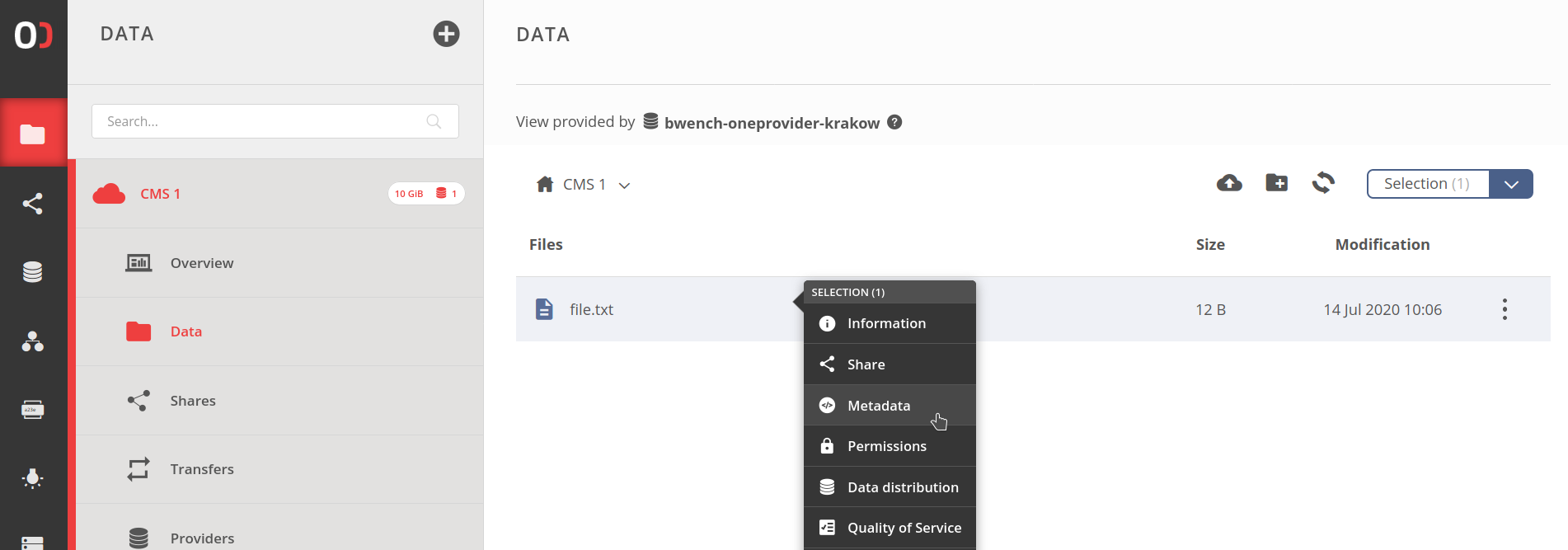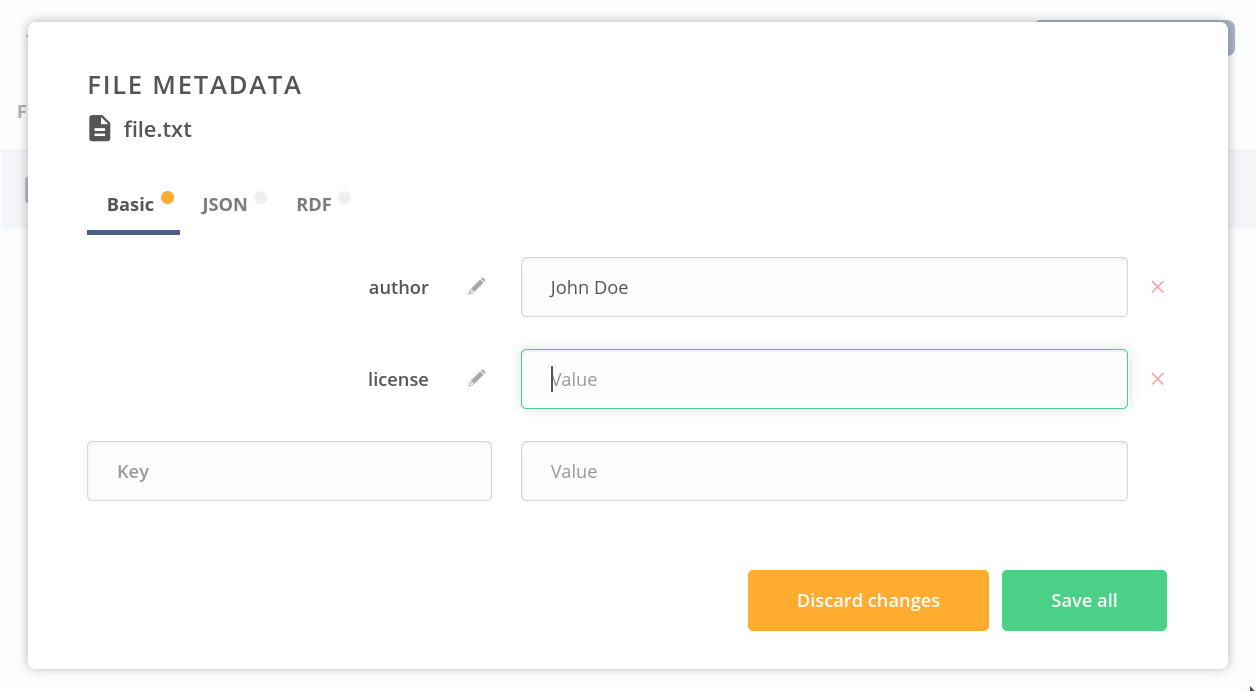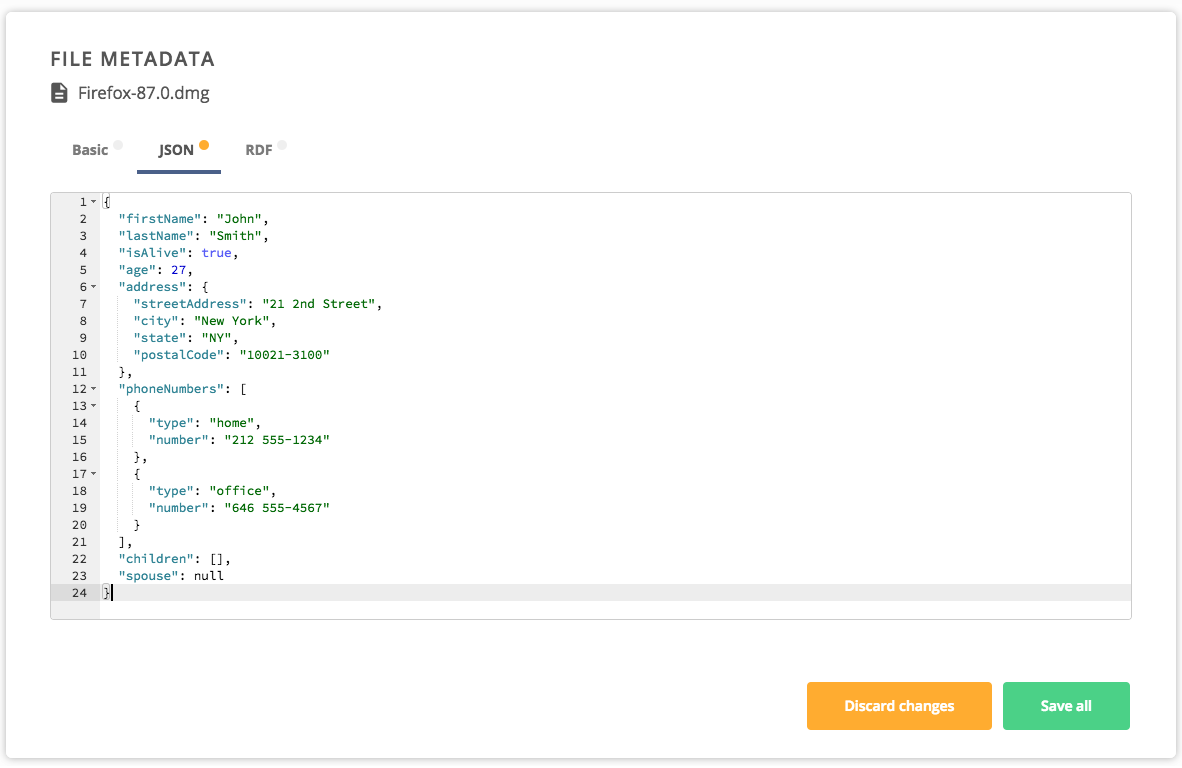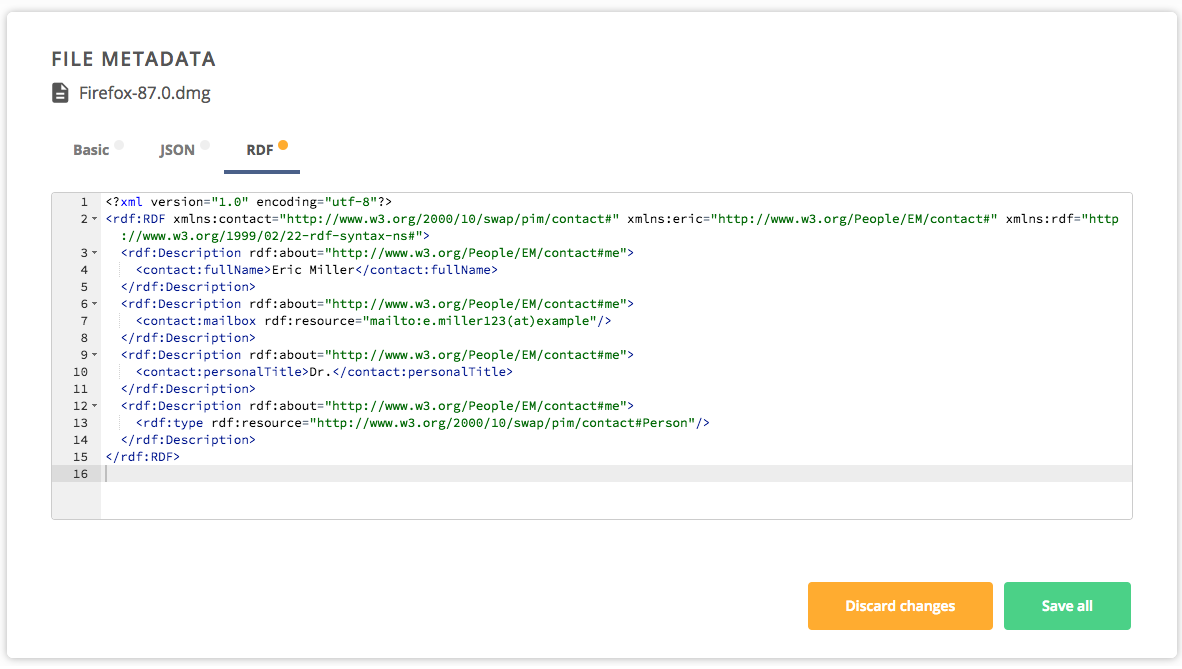# Metadata
# Quickstart
See Web GUI usage examples for the quick guide on how to set or obtain file/directory metadata.
# Basics
In the Onedata system, metadata is organized into 3 levels and regards every file/directory:
- Filesystem attributes — basic filesystem metadata such as file size, creation and modification timestamps, POSIX permissions, etc.
- Extended attributes — simple key-value pairs, compatible with POSIX extended attributes.
- Custom metadata — custom documents in JSON or RDF format.
The filesystem and extended attributes are accessible directly via
POSIX, CDMI and
REST protocols. Custom metadata, on the other hand, is
accessible directly only via REST and indirectly via
POSIX and CDMI
(as extended attributes under special names of onedata_json and onedata_rdf).
# Filesystem attributes
Filesystem attributes are set and modified automatically as a result of various filesystem operations. Most of them are read-only, which means their values cannot be directly modified. The only exception is POSIX mode (permissions). All filesystem attributes are shown in table below.
| Attribute | Sample value | Description |
|---|---|---|
| name | "file.txt" | The name of the object (Space, directory or file) |
| type | "reg" | Specifies whether the resource is a regular file (reg) or a directory (dir) |
| size | 1024 | Size of the file in bytes, always 0 for directories |
| mode | 0666 | POSIX permissions in octal form (i.e. 4 digits starting with 0) |
| atime | 1470304148 | Last access timestamp (in seconds) |
| mtime | 1470304148 | Last modification timestamp (in seconds) |
| ctime | 1470304148 | Last status change timestamp (in seconds) |
| storage_user_id | 6001 | Uid of the storage owner of this file |
| storage_group_id | 6001 | Gid of the storage group owner of this file (the same Gid is displayed via oneclient) |
| owner_id | "6825604b0eb6a47b8b7a04b6369eb24d" | ID of the file owner |
| provider_id | "79c0ed35f32e43db3a87f76a588c9b2f" | ID of the provider on which file was created |
| shares | ["b3a87f76a588c9b279c2...", ...] | Array of share IDs associated with this file/directory |
Some filesystem attributes are considered private and masked when accessing file in share mode (public view for unauthenticated clients). They are:
- storage_user_id — special value of
2147483646is returned instead - storage_group_id — special value of
2147483646is returned instead - owner_id —
"unknown"will be returned instead - provider_id —
"unknown"will be returned instead - mode —
ownerandgroupbits will be zeroed - shares — only share used to access file will be shown in the array (the rest will be omitted)
# Extended attributes
Extended attributes are custom key-value pairs that can be assigned to any file/directory and are compatible with POSIX extended file attributes. Only numeric and string values are allowed — for complex, nested objects, custom metadata must be used.
In general, extended attributes are platform agnostic and users can choose
arbitrary keys and values to be assigned, for instance information about the
author of the file, mimetype, license, etc. One restriction is that all keys
beginning with onedata_ or cdmi_ prefixes are reserved for internal purposes.
# Custom metadata
For each file/directory, users can assign custom documents in supported metadata formats (currently JSON and RDF — Resource Description Framework (opens new window)). This level provides most flexibility as no specific schema is imposed. The custom metadata can be used to create complex views or data discovery indices that consolidate metadata from multiple spaces.
# Web GUI
The easiest way to create, modify and browse metadata attached to files or directories is using the Web GUI metadata editor.
- In order to edit the metadata of a file/directory, simply select Metadata from the file context menu.

- Metadata can also be edited for entire data space, but it has to be invoked from the space context menu.

- The first tab allows edition of the extended attributes in a simple key-value editor.

- In the second tab, JSON metadata can be edited in place or pasted into the editor, which performs live syntax validation.

- The third tab contains an RDF editor that works similarly, but accepts triples in the XML format.

# Metadata management with Oneclient and OnedataFS
In an Oneclient mount, the metadata is exposed through the extended file
attributes. It can be accessed and modified using such tools as
xattr (opens new window) or getfattr:
[/mnt/oneclient/Space1]$ ls
file.json
[/mnt/oneclient/Space1]$ xattr -l file.json
license: CC-0
onedata_json: {"author":"John Doe"}
onedata_rdf: <rdf>metadata_1</rdf>
org.onedata.guid: Z3VpZCM0MmUzYmM5ZmE4ZWYyNjE1ZjAzMjdjMGZmOThkNTk2OGNoYWVlNSM0MWRlYmNmNzI5MTYxNGVkNjRhZjU2YjBmOGM4NTIyOGNoYWVlNQ
org.onedata.file_id: 000000000052036A67756964233432653362633966613865663236313566303332376330666639386435393638636861656535233431646562636637323931363134656436346166353662306638633835323238636861656535
org.onedata.space_id: 41debcf7291614ed64af56b0f8c85228chaee5
org.onedata.storage_id: c7753c5b7c67120fec9c6f412b9dcb9cchd3ec
org.onedata.storage_file_id: /41debcf7291614ed64af56b0f8c85228chaee5/file.txt
org.onedata.access_type: direct
org.onedata.file_blocks: [##################################################]
org.onedata.file_blocks_count: 1
org.onedata.replication_progress: 100%
[/mnt/oneclient/Space1]$ xattr -w license CC-1 File2.txt
Please note that the extended attributes starting with org.onedata. prefix are
Onedata system attributes and cannot be modified. They provide useful information
about files:
org.onedata.guid— the internal GUID of a file/directory in Onedataorg.onedata.file_id— the universal File ID which can be used in REST or CDMI APIsorg.onedata.space_id— the ID of the space to which this file/directory belongsorg.onedata.storage_id— the storage ID on which this file is locatedorg.onedata.storage_file_id— the internal storage file identifier (e.g. file path on POSIX storage)org.onedata.access_type— type of access available for this file:direct— the client has direct access to the storage (e.g. S3 bucket or Ceph pool)proxy— the direct access is not available and all read and write requests will transfer the data through a network connection with the providerunknown— the data access type has not been established yet (it is done only on the first I/O operation on a storage from given mountpoint)
org.onedata.file_blocks— ascii art visualizing the distribution of file blocks which are available on the provider where the oneclient is mountedorg.onedata.file_blocks_count— the number of file blocks which are available on the provider where the oneclient is mountedorg.onedata.replication_progress— the percentage of file blocks which are available on the provider where the oneclient is mounted
Similarly to Oneclient, extended attributes and metadata can be accessed and modified from the OnedataFS Python interface:
from fs.onedatafs import OnedataFS
onedata_provider_host = "..."
onedata_access_token = "..."
# Create connection to Oneprovider
odfs = OnedataFS(onedata_provider_host, onedata_access_token)
# Open selected space directory
space = odfs.opendir('/Space1')
# List SpaceA contents
space.listdir('/')
['file.json']
# List extended attributes names for `file.json`
space.listxattr("file.json")
['license',
'onedata_json',
'onedata_rdf',
'org.onedata.guid',
'org.onedata.file_id',
'org.onedata.space_id',
'org.onedata.storage_id',
'org.onedata.storage_file_id',
'org.onedata.access_type',
'org.onedata.file_blocks_count',
'org.onedata.file_blocks',
'org.onedata.replication_progress']
space.getxattr("file.json", "org.onedata.space_id")
b'"f733305f7a0a81dce39666713a516f0b"'
space.setxattr("file.json", "license", '"MIT"')
space.removexattr("file.json", "license")
# REST API
All operations related to file metadata can be performed using the REST API. Refer to the linked API documentation for detailed information and examples.
| Operation | Link to API |
|---|---|
| Read filesystem attributes | API (opens new window) |
| Set filesystem attributes | API (opens new window) |
| Manage extended attributes & custom metadata | API (opens new window) |
# Creating views over metadata
Please refer to views documentation for instructions on how to create complex database views over data collections using metadata.
# Data discovery
File and directory metadata can be used to feed data discovery indices that harvest metadata from multiple spaces and provide advanced search engines.
← Tokens Data Discovery →